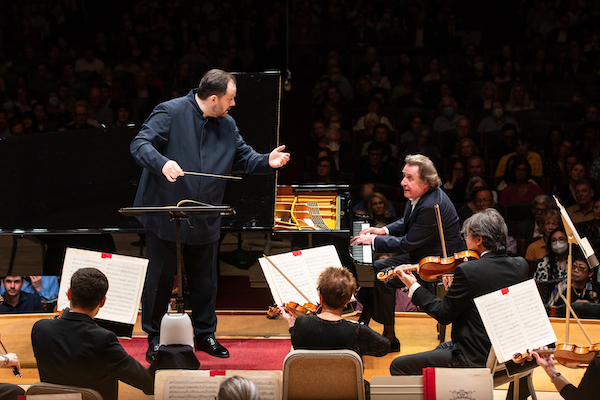Concert Review: Boston Symphony Orchestra’s Season Opener — A Mostly Auspicious Evening
By Aaron Keebaugh
Ten years on, Andris Nelsons retains his remarkable gifts for expressing the raw power of music with dazzling panache.

Pianist Rudolf Buchbinder joins Andris Nelsons and the Boston Symphony Orchestra. Photo: Robert Torres
Some occasions call for celebration. Others for reflection. Andris Nelsons and the Boston Symphony Orchestra rang in their 143rd season by appealing to both.
Thursday night at Symphony Hall witnessed the orchestra and its Latvian conductor, now in his 10th year at the helm, looking to the past as well as the present. Mozart’s Piano Concerto No. 23 in A, K. 488, was the occasion for the return of Rudolf Buchbinder, acclaimed as one of the most thoughtful interpreters of classical repertoire. Arturs Maskats’s bold and radiant Tango made its Symphony Hall debut. And the suite from Richard Strauss’s Der Rosenkavalier served up a slice from Nelsons’s most recent Strauss recording project with the Boston Symphony and Gewandhaus Orchestras.
If the latter two works generated the greatest excitement, the Mozart concerto fell askew interpretatively.
Buchbinder has long approached Mozart’s music by eschewing heroic showmanship in favor of scholarly fealty to the original sources. That has led to performances, available on his numerous recordings of the concertos, that dazzle by dovetailing nuances of phrasing and dialogue with chamber-like orchestral accompaniment.
But the Austrian pianist tends to come across more compelling on record than in person. At least on this go-around, his performance of Mozart’s evergreen concerto lacked focus and direction. On the one hand, he adapted an overly lush approach to the outer movements. His tone couldn’t be described as pearly — it was hazy, fitfully smoothing over most of the music’s attacks, arpeggios, and accents. On the other hand, he adhered to a refined keyboard presence. His lines had the feel and intimacy of a chamber musician, but the sound barely rose above the accompaniment and never quite complemented the whole. Buchbinder managed to fall between two stools, the expansive and the contractive.
Only in the second movement did the pianist attempt to correct these lapses. There, his lines mingled fluently with the winds and strings. Still, while Nelsons wove an attractive cushion of support from the orchestra, the effect too often felt limp, disconnected from Buchbinder’s efforts. The impression was that soloist and orchestra were adrift.
In contrast, Maskats’s Tango found the BSO in sturdier focus. Premiered in 2003, this score is an ode to the popular dance as well as a nostalgic — perhaps Straussian — look at a dated cultural icon in its high-flying twilight. Musically, it is 10 minutes of sheer fun — simple gestures build to a din that then shatter, leaving only a solo bandoneon squeezing out a simple tune. The orchestra responds with a final furious surge that eventually crashes.
Nelsons led the work with his usual diligence. Solo clarinet floated gently over strumming harpsichord, setting up a Bolero-like sweep. Cellos and basses chugged out the called-for rhythm while providing firm support for the clash of brass and woodwinds overhead. Julien Labro played his bandoneon with a zesty sensitivity. If this music, as Nelsons’s reading suggests, glances back at the golden age of tango, it does so through a nimble mix of warm solace and outright force.
That ambivalent spirit also runs through Strauss’s suite from Der Rosenkavalier, which views the waltz through a distorted lens. As per his usual approach to late-romantic scores, Nelsons took the time to smell every single rose, tastefully exaggerating the idiomatic Viennese style of Baron Ochs’s waltz, particularly its culminating flourishes. The opening passage — taken from the opera’s overture — crested and broke like fitful waves in a storm. The heartfelt “Ist Ein Traum” at the center of the suite still suggested yearning given Nelsons’s languid tempos. The climactic points came off splendidly — a Mahlerian apotheosis springing forth from the bawdy and all-too-Straussian flourishes.
Nelsons opened the concert with Beethoven’s Consecration of the House. If balances occasionally felt out of sorts — the brass were too heavy against the winds and strings — the verve and enthusiasm of this reading set the stage for a mostly auspicious evening. Ten years on, Nelsons retains his remarkable gifts for expressing the raw power of music with dazzling panache.
Aaron Keebaugh has been a classical music critic in Boston since 2012. His work has been featured in the Musical Times, Corymbus, Boston Classical Review, Early Music America, and BBC Radio 3. A musicologist, he teaches at North Shore Community College in both Danvers and Lynn.
Tagged: Andris Nelsons, Boston Symphony Orchestra
